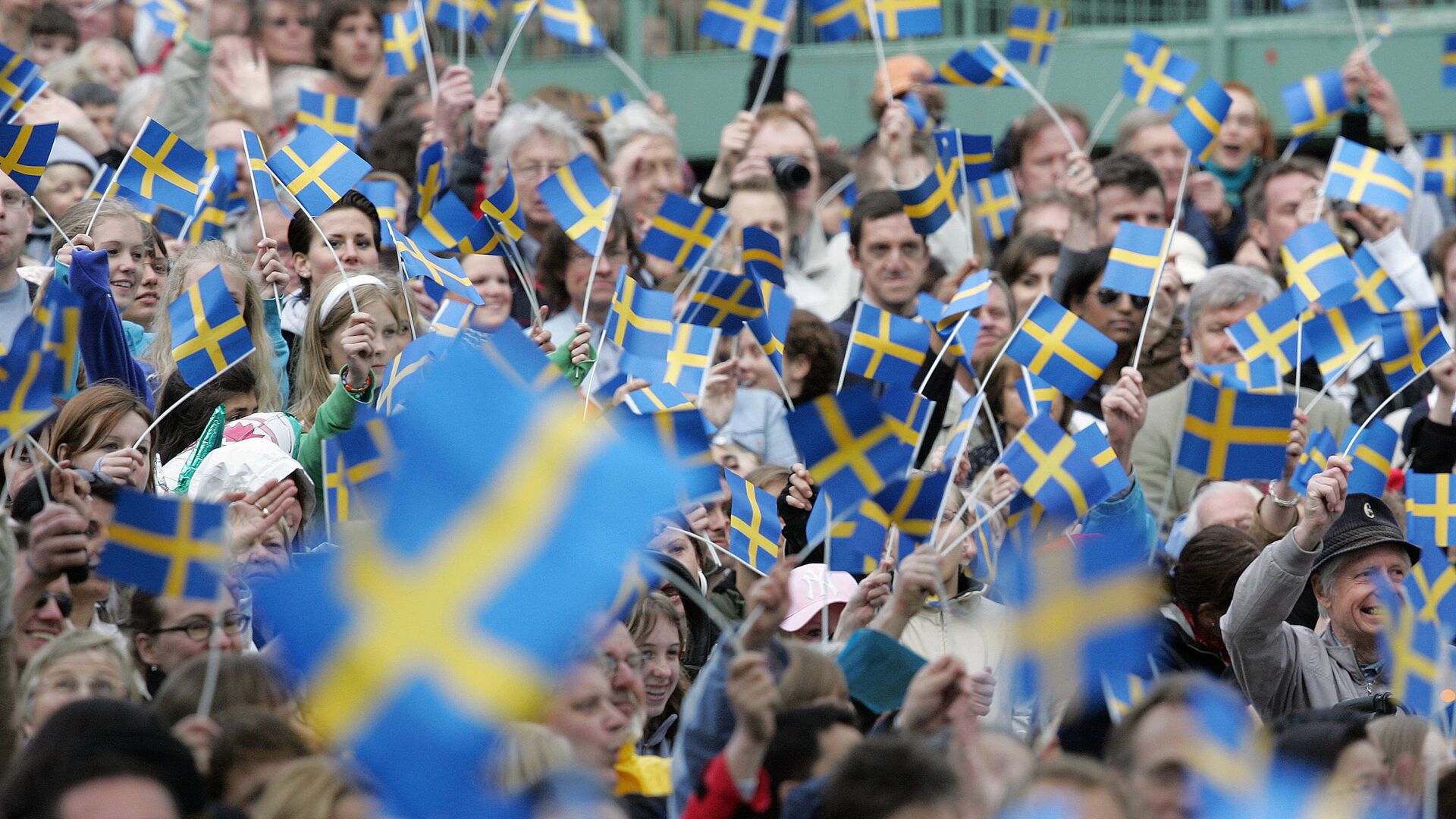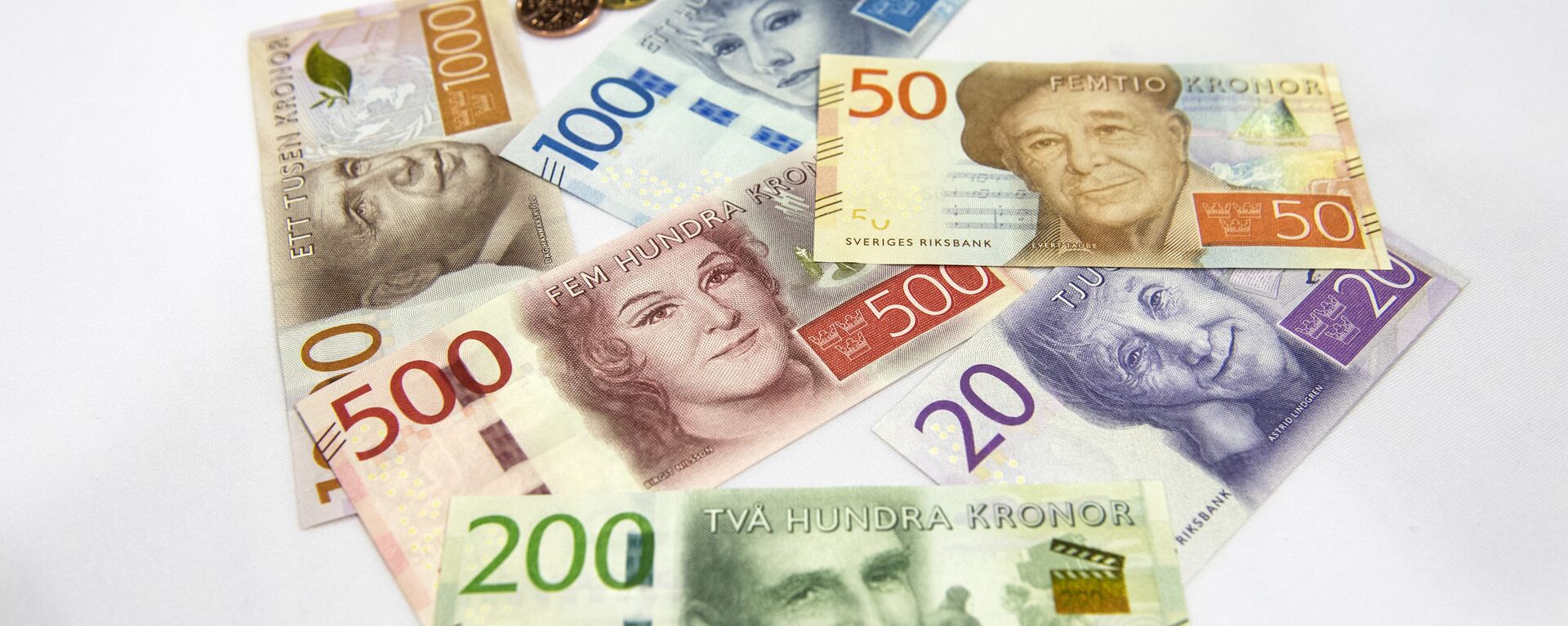https://sputnikglobe.com/20230313/fewer-swedes-call-themselves-liberals-feminists-as-more-switch-to-conservatism-1108324382.html
Fewer Swedes Call Themselves Liberals, Feminists as More Switch to Conservatism
Fewer Swedes Call Themselves Liberals, Feminists as More Switch to Conservatism
Sputnik International
Swedish pundits ventured that the liberal project is "no longer dominant," with the public debate moving into the opposite direction.
2023-03-13T06:48+0000
2023-03-13T06:48+0000
2023-03-13T06:48+0000
world
sweden
scandinavia
news
liberalism
conservatism
feminism
https://cdn1.img.sputnikglobe.com/img/102124/11/1021241123_0:108:2800:1683_1920x0_80_0_0_7baae1d063cb31f7ecc910f5a22a98b9.jpg
Fewer Swedish voters see themselves as liberals now compared to a year ago, a survey made by pollster Ipsos on behalf of Swedish media has shown.A year ago, 31 percent of Swedish voters called themselves liberals, a figure that has now dropped to merely 26 percent.The development is particularly clear among the ruling Moderates' voters, signaling a change of heart. In a single year, the percentage of self-professed liberals has fallen from 46 to 35 percent. At the same time, the proportion of Moderate voters who call themselves conservatives has increased to a corresponding degree, signaling that the party is returning to its roots, as it has long been the largest right-of-center force in the Nordic country.The Moderate Party (formerly known as the Right and the Conservatives) dates back over a century and is one the pillars of Swedish politics, as largely the only one to have challenged the Social Democrats' decades-long domination starting from the mid-20th century.However, it was under Fredrik Reinfeldt's tenure that the Moderates rebranded themselves as liberal and progressive. During the Reinfeldt years, when the then-prime minister called on his compatriots to "open their hearts" and embrace mass immigration, Sweden switched to an "open borders" approach. By contrast, current Moderate leader and Prime Minister Ulf Kristersson ran on the platform of "straightening out Sweden," promising his voters to tackle issues ranging from crime to the immigrant crisis with a conservative agenda in mind, for which he came under fire internally from the liberal phalanx.A similar pattern of fewer voters calling themselves liberals and more conservatives is visible among fellow right-wing parties: the Christian Democrats and the Sweden Democrats.Feminism has seen a similar development. In 2021, 30 percent of the Swedish electorate called themselves feminists, and today the figure has fallen to 24 percent.Again, this is indicative of a paradigm shift in Swedish politics. In late 2022, Sweden’s minority coalition government led by the Moderates announced that it was ditching the country’s "feminist foreign policy" proudly launched by its left-wing predecessors less than a decade ago.Among others, Foreign Minister Tobias Billstrom said the approach minted and popularized by the Social Democrats was counterproductive for Sweden's international agenda.While Sweden has long placed an emphasis on women's rights and made an effort to portray itself as their champion both domestically and internationally, the fruits of the self-proclaimed "feminist foreign policy" have been questionable at best, as Sweden under Social Democrat rule managed to damage relations with Israel and the Arab world alike, as its then-Foreign Minister Margot Wallstrom, an avowed feminist, recognized Palestine as a state and slammed Saudi Arabia's ways as "medieval."Swedish pundits acribed the apparent decline of liberalism and feminism to a news cycle dominated by wars, crime and crises ranging from energy to the economy. Among others, Ipsos analyst Nicklas Kallebring ventured that the liberal project is "no longer dominant," with the public debate moving into the opposite direction.
https://sputnikglobe.com/20230309/sweden-sees-record-breaking-spike-in-food-prices-in-february-1108201683.html
sweden
scandinavia
Sputnik International
feedback@sputniknews.com
+74956456601
MIA „Rossiya Segodnya“
2023
News
en_EN
Sputnik International
feedback@sputniknews.com
+74956456601
MIA „Rossiya Segodnya“
Sputnik International
feedback@sputniknews.com
+74956456601
MIA „Rossiya Segodnya“
conservative views, liberal views, feminist approach, mass immigration, conservative agenda
conservative views, liberal views, feminist approach, mass immigration, conservative agenda
Fewer Swedes Call Themselves Liberals, Feminists as More Switch to Conservatism
Swedish pundits have ascribed the decline of liberalism and feminism to a news cycle dominated by wars, crime and crises ranging from energy to the economy. They even ventured that the liberal project is "no longer dominant," with the public debate moving into the opposite direction.
Fewer Swedish voters see themselves as liberals now compared to a year ago, a survey made by pollster Ipsos on behalf of Swedish media has shown.
A year ago, 31 percent of Swedish voters called themselves liberals, a figure that has now dropped to merely 26 percent.
The development is particularly clear among the ruling Moderates' voters, signaling a change of heart. In a single year, the percentage of self-professed liberals has fallen from 46 to 35 percent. At the same time, the proportion of Moderate voters who call themselves conservatives has increased to a corresponding degree, signaling that the party is returning to its roots, as it has long been the largest right-of-center force in the Nordic country.
The Moderate Party (formerly known as the Right and the Conservatives) dates back over a century and is one the pillars of Swedish politics, as largely the only one to have challenged the Social Democrats' decades-long domination starting from the mid-20th century.
However, it was under Fredrik Reinfeldt's tenure that the Moderates rebranded themselves as liberal and progressive. During the Reinfeldt years, when the then-prime minister called on his compatriots to "open their hearts" and embrace mass immigration, Sweden switched to an "open borders" approach. By contrast, current Moderate leader and Prime Minister Ulf Kristersson ran on the platform of "
straightening out Sweden," promising his voters to
tackle issues ranging from crime to the
immigrant crisis with a conservative agenda in mind, for which he came under fire internally from the liberal phalanx.
A similar pattern of fewer voters calling themselves liberals and more conservatives is visible among fellow right-wing parties: the Christian Democrats and the Sweden Democrats.
Feminism has seen a similar development. In 2021, 30 percent of the Swedish electorate called themselves feminists, and today the figure has fallen to 24 percent.
Again, this is indicative of a paradigm shift in Swedish politics. In late 2022, Sweden’s minority coalition government led by the Moderates announced that it was ditching the country’s "
feminist foreign policy" proudly
launched by its left-wing predecessors less than a decade ago.
Among others, Foreign Minister Tobias Billstrom said the approach minted and popularized by the Social Democrats was counterproductive for Sweden's international agenda.
While Sweden has long placed an emphasis on women's rights and made an effort to portray itself as their champion both domestically and internationally, the fruits of the self-proclaimed "feminist foreign policy" have been questionable at best, as Sweden under Social Democrat rule managed to damage relations with Israel and the Arab world alike, as its then-Foreign Minister Margot Wallstrom, an avowed feminist, recognized Palestine as a state and slammed Saudi Arabia's ways as "medieval."
Swedish pundits acribed the apparent decline of liberalism and feminism to a news cycle dominated by wars, crime and crises ranging from energy to the economy. Among others, Ipsos analyst Nicklas Kallebring ventured that the liberal project is "no longer dominant," with the public debate moving into the opposite direction.



